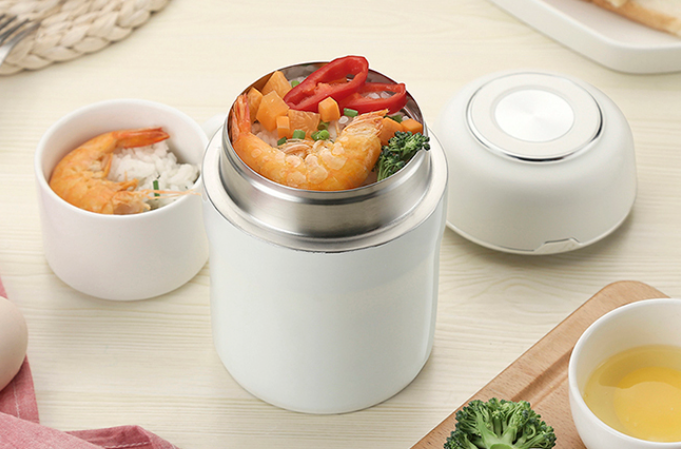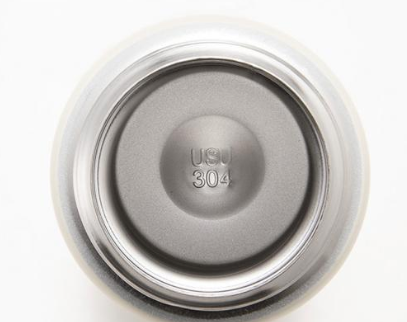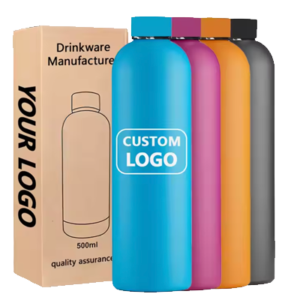Can I Store Buttermilk in Stainless Food Jars?
Buttermilk, with its slightly tangy flavor and smooth texture, is a popular choice for both drinking and cooking. Whether it’s used in pancakes, marinades, or enjoyed as a refreshing beverage, many health-conscious consumers include it in their daily routines.
At the same time, stainless food jars are becoming a go-to option for carrying meals in schools or offices. Known for their insulation, durability, and sleek design, these jars are widely used to store everything from soups to smoothies.

But here’s the question: is it safe to store an acidic dairy product like buttermilk in a stainless steel food jar? Will the acidity affect the container?
Table of Contents
ToggleIs Buttermilk acidic?
Buttermilk typically has a pH level between 4.4 and 4.8, which classifies it as mildly acidic. While this level of acidity is safe for consumption, it can pose challenges when it comes to storage—especially in metal containers.
Acidic liquids have the potential to react with certain metals, particularly when stored for extended periods or under heat. This reaction may not only affect the taste and quality of the liquid but could also lead to the leaching of unwanted substances from the container material.
That’s why choosing the right type of stainless steel is crucial when it comes to storing buttermilk. Not all stainless steel is created equal—some grades offer better corrosion resistance and are more suitable for handling acidic contents safely.
Which Stainless Steel Jars Are Safe for Buttermilk?
Not all stainless steel is safe for storing acidic liquids like buttermilk. The key lies in the grade of stainless steel used in the food jar.
Food-grade 304 or 316 stainless steel – Recommended
304 stainless steel, also known as 18/8 stainless, is the most commonly used food-grade material. It offers excellent resistance to corrosion and is widely used in kitchenware, food containers, and beverage bottles. It can handle mildly acidic contents like buttermilk without leaching metals or affecting taste.

For even better resistance, 316 stainless steel (sometimes called “surgical-grade” stainless) includes added molybdenum, which enhances its protection against acidic and salty environments. This makes it the top choice for high-end food jars, especially if you plan to store acidic foods regularly or for longer periods.
201 stainless steel – Not recommended
While 201 stainless steel may look similar on the surface, it contains lower levels of nickel and higher amounts of manganese, which makes it more prone to corrosion—especially when exposed to acidic liquids. Storing buttermilk in containers made with 201 stainless steel could lead to metallic taste, discoloration, or even material degradation over time.
Always check the material label. If your food jar is made with 304 or 316 stainless steel, storing buttermilk is safe and worry-free. Avoid unmarked or 201-grade containers when dealing with acidic dairy products.
Practical Tips for Storing Buttermilk Safely
Even when using a high-quality stainless steel food jar, a few simple precautions can help ensure both safety and product longevity:
Avoid long-term storage (over 12 hours):
Buttermilk is best consumed fresh. While stainless steel jars can keep it cool for hours, storing acidic dairy for more than 12 hours may increase the risk of spoilage and unnecessary exposure to acid for the container’s interior.
Clean thoroughly after each use:
After pouring out the buttermilk, rinse the jar promptly with warm water and a mild detergent. Let it air-dry completely before sealing it again. This helps prevent acid residue from corroding even high-grade stainless steel over time.
Avoid repeated heating of dairy beverages:
Reheating buttermilk or other dairy drinks directly in the jar—especially at high temperatures—can compromise both the quality of the liquid and the seal integrity of the jar. Most insulated jars are designed for temperature retention, not repeated reheating.
By following these basic care tips, you can confidently enjoy buttermilk on the go without compromising safety or your stainless steel jar’s performance.
Tips for Wholesalers
For brands and wholesalers sourcing stainless steel food jars, it’s important to match the product’s material with the intended usage. If your customers plan to use the jars for dairy drinks, smoothies, or mildly acidic contents like buttermilk, we strongly recommend choosing models made with 316 stainless steel. Compared to 304, 316 offers superior corrosion resistance—making it a premium choice for high-end, versatile products.
Offering custom options with 316 stainless steel not only enhances your product’s safety and durability but also widens its application range—appealing to health-conscious consumers and those who carry acidic foods or drinks.
When placing wholesale orders, clearly communicating the material grade and intended use will help you avoid customer complaints and boost your product’s value in the market. Investing in high-quality materials builds brand trust and positions your offering as a reliable solution in the competitive insulated container market.
Related Article


